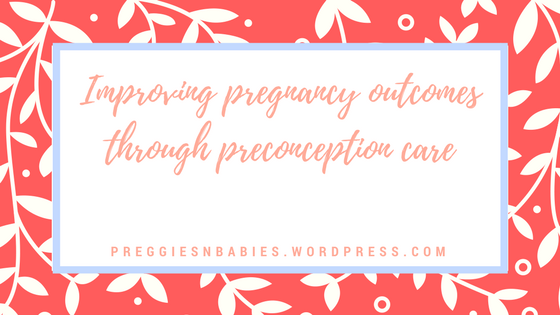IMPROVING PREGNANCY OUTCOMES THROUGH PRECONCEPTION CARE

The joy of every woman is to carry her own baby. The emotional trauma and anxiety involved with infertility can be quite disturbing. Infertility is one condition occurring more frequently in Nigeria today. I discovered that women can take steps to improve their fertility and prepare for conception through interventions known as preconception care which is highly recommended by the World Health Organisation. If women are more aware of these interventions there would be better pregnancy outcomes, reduced miscarriages and in the long run reduce maternal mortality. Preconception care according to world health organization is defined as the provision of biomedical, behavioral and social health intervention to women and couples before conception occurs. Preconception care in the simplest term would be the care given to identify and correct factors that can reduce the chances of fertility. Preconception care ranges from counseling on appropriate health behaviors to screening tests on various infections and diseases. Preconception care is not limited to just women but involves both parties. It is highly recommended for couples planning or preparing to conceive.
Benefits Of Preconception Care
- It prepares couples physically and mentally for the child, hence they are better prepared.
- There are no side effects or disadvantages to undergoing preconception care.
- It reduces the incidence of congenital birth defects.
- It improves pregnancy outcomes and prevents maternal mortality.
- It also prevents neonatal mortality.
- It ensures better pregnancy outcome.
There are some lifestyle changes individuals can adopt which can help to improve fertility which can be very useful to infertile couples such as :
-FOLIC ACID SUPPLEMENTATION: folic acid supplementation is highly recommended for women who are planning to become pregnant and also pregnant women, folic acid has been proven to reduce neural tube defects such as spina bifida. Folic acid is usually given at antenatal clinics to prevent neural tube defects.
-NUTRITION: women are advised to be at optimum weight for body build and height, consumption of a balanced diet, inclusion of micronutrients such as calcium and folic acid into the diet. Use of folic acid use three months prior to the time of conception is highly encouraged. Folic acid supplementation has been proven to be highly effective in the prevention of neural tube defects.
-EXERCISE: establishment of a regular exercise routine is advised at least three months before conception. It improves circulation and general health. Exercise also helps in weight reduction for women who are obese (having a body mass index of 30 and above). Obesity poses a threat to fertility and also increases the incidence of congenital birth defects.
The couple is advised to stop smoking. Both active and second-hand smoking can affect fetal development and even cause possible pregnancy loss. you can read on the effects of smoking in my previous post on Smoking and pregnancy.
Visit your hospital or go to fertility clinics which offer preconception care to help in carrying out the necessary physical examination and further counselling. Some screening tests carried out include blood type, Rhesus factor, hepatitis, Chlamydia and rubella screening.
Where can I get preconception care?
You can get preconception care from hospitals that offer this service, maternal and child health clinics such as st Ives or fertility clinics such as bridge clinic or George’s memorial.
I would encourage both fertile and infertile couples to go for preconception care as it would help identify cause of infertility and ensure better pregnancy outcomes.
I hope this article is useful , please read and share you can help someone.
